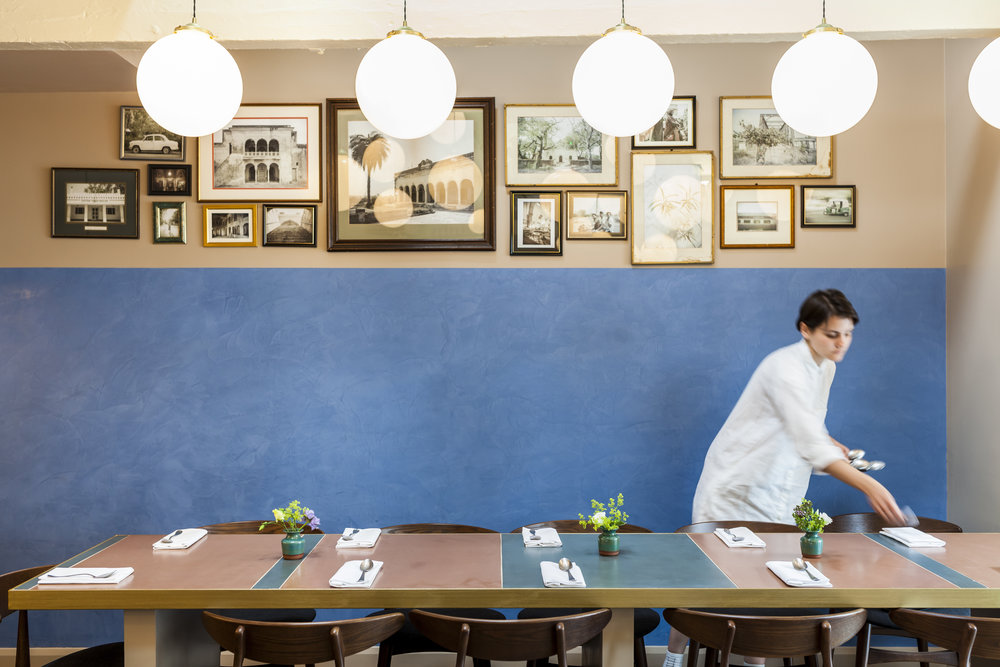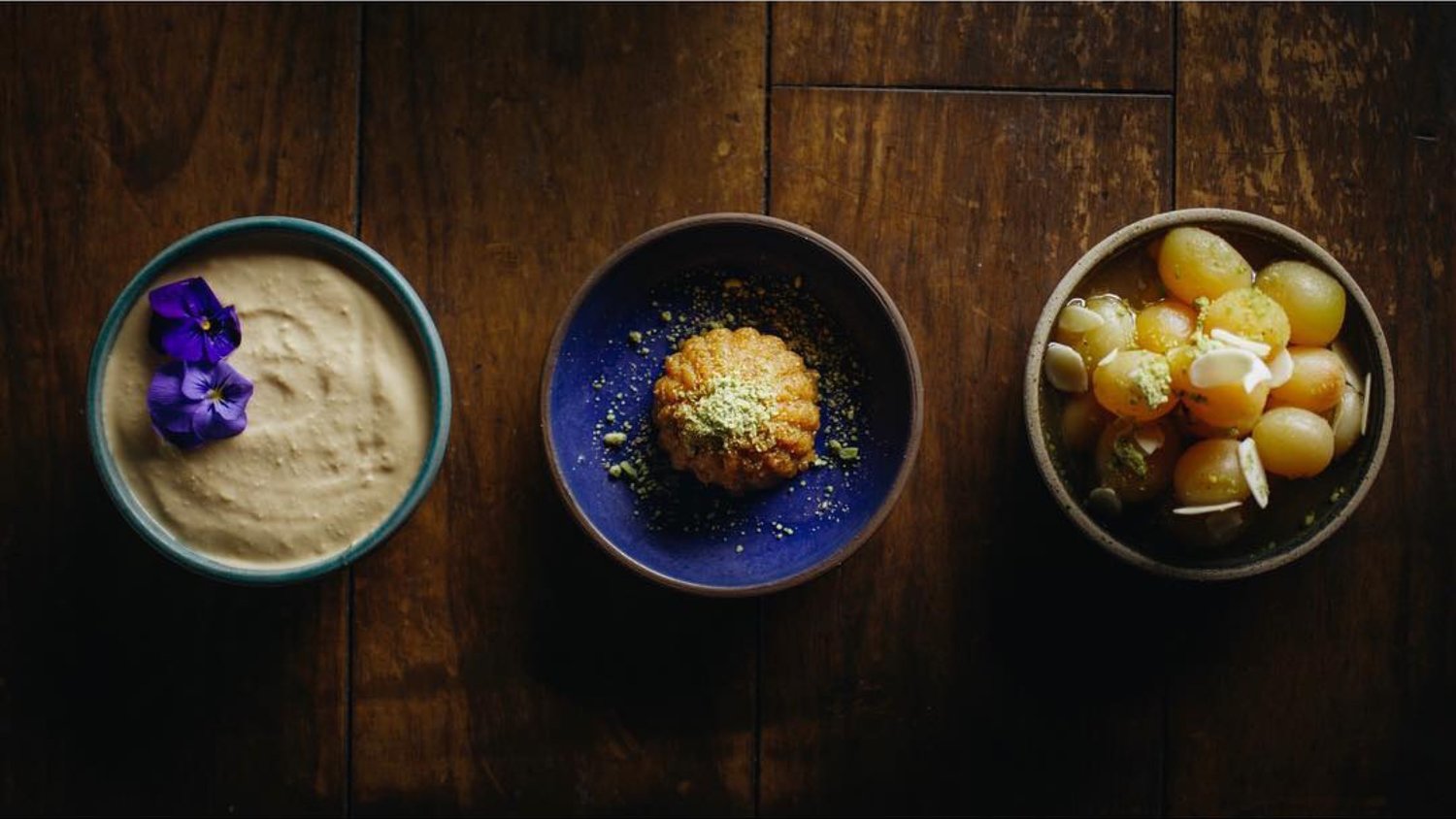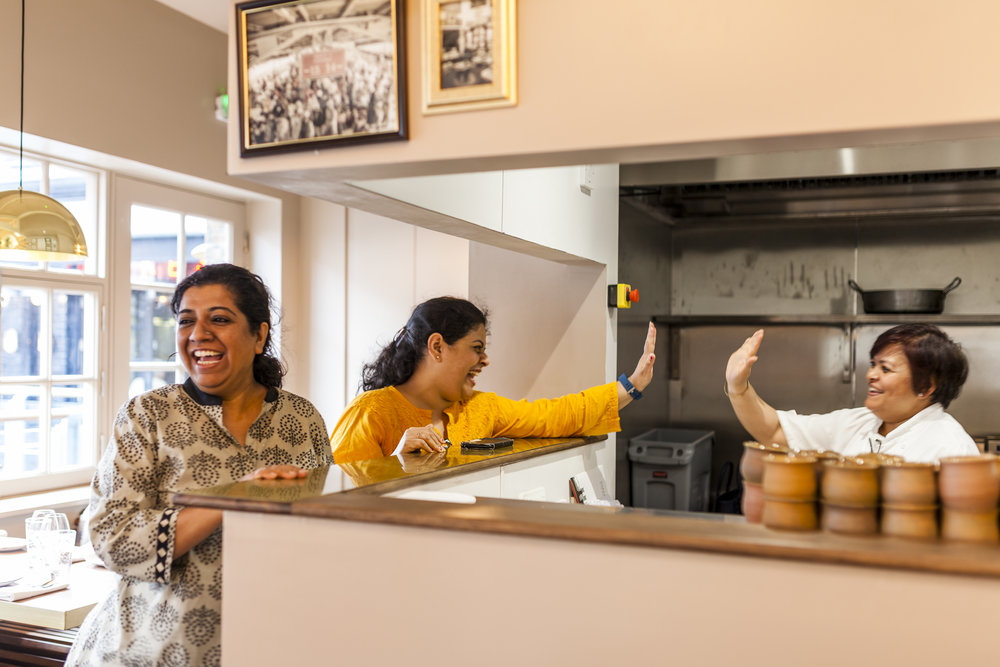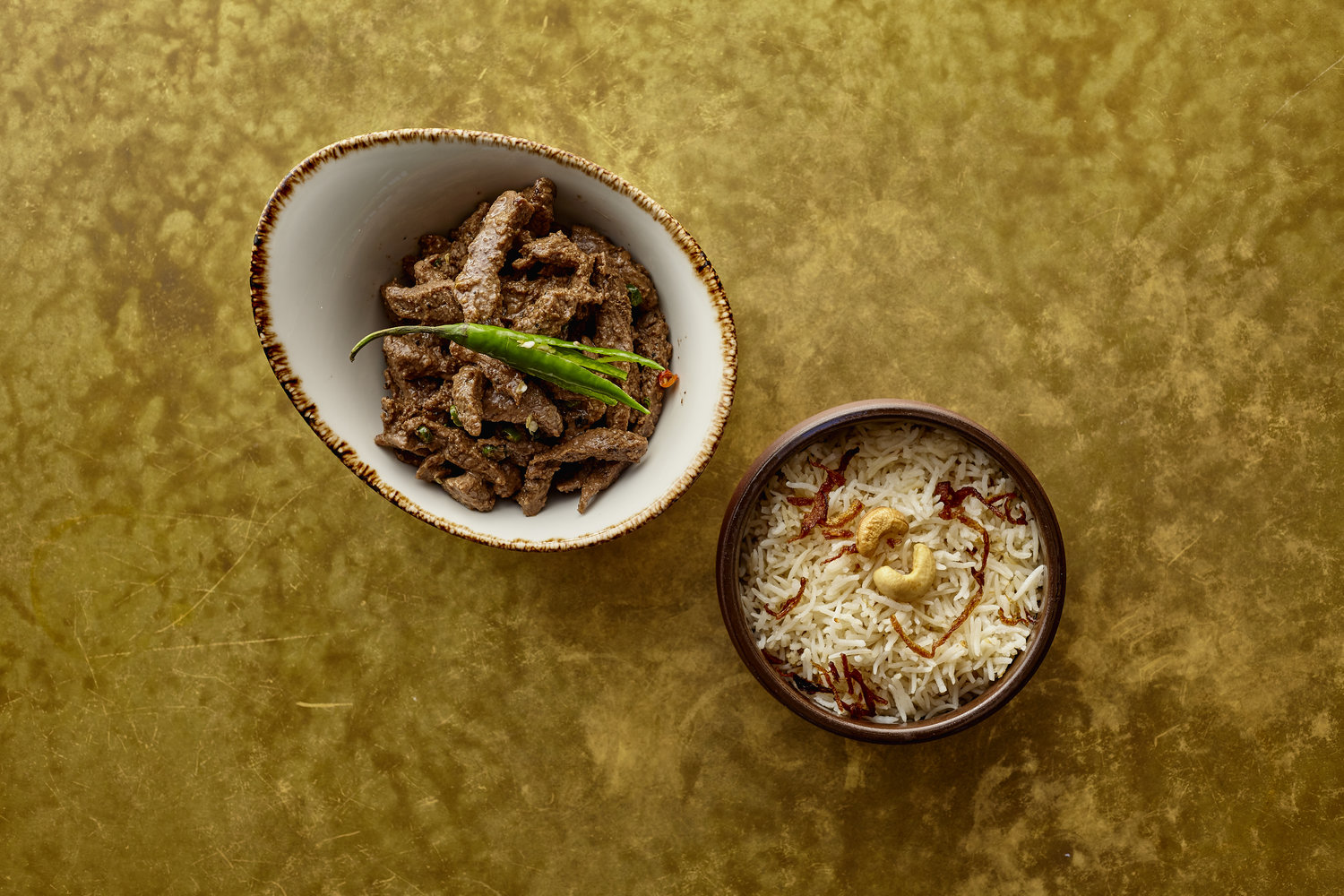
Chef Asma Khan shot to culinary fame when she opened the all-female staffed London eatery Darjeeling Express. Her renown increased even further thanks to an episode in season six of Netflix’s Chef’s Table. With plenty of buzz and some famous fans, the chef used her time in the spotlight wisely — by continuing to fight for women and migrants across the industry.
Then everything changed. Khan had to close her restaurant in March. Rather than running takeout or grocery service, the Darjeeling Express staff isn’t working at all right now (though she vowed to pay everyone’s salaries, no matter what). And with the whole industry in a holding pattern, Khan — like every chef — has concerns about what the industry might look like when it comes back, which parts of it will survive, and how our collective “new normal” will play out.
We caught up with Chef Khan over the weekend to talk about this strange, often-scary moment in history. The conversation also gave her a chance to share her approach to supporting her staff during the shutdown while juxtaposing the U.K. government’s approach versus the U.S.

Since opening, you’ve been a huge advocate of women in the restaurant industry. Can you talk us through how that became such a big part of Darjeeling Express and your work in the restaurant industry?
I realized when I was starting to set up Darjeeling, everyone was so surprised that I was going to set this kitchen up with an all-woman kitchen and crew. I didn’t think it was so unusual when I was setting up the restaurant because all these women had been with me during my supper club days. This was my natural team to cook with and I just thought it was very natural. It was the people’s reaction that made me realize it was something unusual. And it’s not even that I wanted to start off by having an all-female restaurant kitchen, it was the team that started with me. They took the journey with me. These women were nannies from the school where my kids went. We used to do supper clubs together in my house. Then we moved to the pub. And then, when we opened the restaurant, they moved to the restaurant.
What was the reaction you got from that?
I did get a lot of comments from people that I should really get some men in there, some “professionals” in there. Not even for a second did I think that this was something I would even consider. In my heart, I always dreamt and imagined that we would be successful.
I wanted so badly to succeed, to show that it’s possible that the passion and skills of these women, who are home cooks, are on par with anybody who’s learned professionally. We were not different. Yes, we were a lot older and we may not look like all the other chefs working in other restaurants. But I see people by their passion and how much love and desire they have to cook, and this was, for me, the perfect team.
You were then able to make it about more than just your team. You used your voice to start fighting for women and migrants in the kitchen across the industry.
Well, the thing is what triggered this was that a very well-known male chef had been accused of sexual harassment. And an outside agency came in and verified that, yes, it was true that there had been sexual harassment, pretty serious sexual harassment. But the outcome of that decision was that the women who had complained lost their jobs, and he was promoted from head chef to executive chef.
And that just stunned me. Then the response on social media of chefs in the industry — they were having this argument that this was not really a promotion.
Wow.
They were saying being promoted to an executive chef is not really a promotion from a head chef. I was just astounded — is this what this debate was about? What about those three women?
That was a turning point for me. I wrote an article in one of the newspapers without fear. They did warn me that there’s a risk of you being sued. I said, “I have no fear,” because if I just call it out of how unfair it was that these women lost their jobs, even though the harassment was proven — because there was an outside agency, third party, who was neutral and said that, yes, this had happened. If this was seen as okay in an industry — any other industry — there would be a huge outcry over how appalling it was that the decision was made. But the silence, especially from female chefs, was deafening.
There was a lot of kind of… getting together of male chefs in defense of this particular person. That’s when I realized that I need to pick my corner, and I need to fight, not for my own team because we’re okay. Sometimes, occasionally, we argue, of course. It’s not that everything is perfect. Occasionally, we do have problems in our kitchen as well as between the women, but that it is all kitchens. I know there’s no bullying, and I’m there all the time. But this was time for me to lend my voice to the voiceless.
What happened next?
The irony of it all is that after I wrote in defense of these girls, they came to the Darjeeling Express. I knew the three girls sitting over there crying were “those girls.” But I didn’t walk up to them because I couldn’t do this to them. Then they wrote to me saying, “We came to honor you. We came to honor someone who cared enough.”
That’s when I realized that they were so scared they’d never work again in this industry. Because when everybody is silent, it’s very scary. If your head of your kitchen is a woman, and something like this happens and they’re silent, she may personally find it revolting what happened, but if she does not say anything publicly, that silence is very, very toxic because it makes you feel that if this happened to you, no one would speak up in your defense.
I realized that and thought, “Let me be that voice speaking up for these women, and if it means that I have to deal with a lot of aggression from other people, I can deal with that. I can deal with that because the pain is not personal.”
Do you feel your success with Darjeeling Express and Netflix fueled you?
We’re successful, but for me, the success has to be very much like what my father said about privilege. He taught me that you do not use it for your personal joy and getting money or just individually reaping the benefits of success. I wanted the success of Netflix, the success of the recognition and the accolades that the restaurant got. Then, I wanted to transform that success into a weapon that I could use to talk about what is happening to women and to bring forward other women.
After Netflix, I realized that people would be interested in listening to what I had to say. I thought, “I don’t want that opportunity to do a pop-up in New York with some trendy chef and make a lot of money.” I’m not taking the money to my grave. It’s like when you know you have a speech in front of you, before going to go on stage. You have limited time there. When the spotlight hits you, you say your lines, and then, you get off, and you go back into the wings. This is my time, and the spotlight has hit me, and the lines that I read out are very important. They should not be about me trying to become more famous or networking more or making money. I know I probably sound very idealist, but this is my time to speak for those who didn’t get the time to get on stage.

Then the world changed. You shut down Darjeeling before, arguably, the UK was taking this as seriously as they perhaps should have been. And it’s become obvious that women, minorities, and migrants, they’re the first three groups either forced to the frontline or on the chopping block to get left behind when things like this happen?
Absolutely. Nothing hits home harder than when you saw that the first four people to die in the NHS [National Health Service] in this country were black and Asian men — all migrants — who were working for the NHS. The first nurse who died was a Muslim mother, someone wearing a hijab, a mother of three, who made a career in nursing because she wanted to improve her life.
These things all rip me apart because I understand that it is, again, immigrants, and it is, again, women who have already paid the price with their lives in the health service and in hospitality, too.
What does… all of this look like down the road to you?
When the doors open, it will be a much harsher regime because … of course, all of us are going to lose a lot of money. We’re all going to come back with much tighter budgets. When the money is tight, you will find owners who will squeeze the low paid workers, invariably the low-wage migrant workers who are Black or Asian. The women who are lower down in the pecking order will be made to work extra hours, not being paid for overtime. When there wasn’t a justification for the exploitation of weaker people in kitchens and in our industry, it was already rampant. I’m afraid that a lot of people are going to come back and use what has been very brutal, without a doubt, financially as an excuse.
It’s devastating what’s happened, the closures. To go back in there to pick up the pieces and start again will be difficult. But I hope that this time away will have taught owners of restaurants and chefs and big decision-makers in hospitality about compassion and about community and about survival. I’m hoping that they will come back softer and kinder and less toxic and less hostile and that they see the value of human life because they made it through this, and that other person who they’ve hired has also made it through it.
I hope it will actually bring us, bring the industry up to what it should be — about service, about compassion, about love, and celebrating cuisines. Not about bullying and suppression of a particular gender while also of underpaying people.
You decided to close your doors completely, whereas other restaurant owners have tried to do carryout service or delivery service to varying degrees of success. What was behind your decision to close entirely as opposed to phasing in delivery?
I didn’t want to expose my staff to public transport, which was packed at that time. This is how most people travel in London. I knew that this virus was being transported by people being in close contact. I didn’t want to do that to my staff.
I didn’t want to risk my front-of-house while they were serving in a small restaurant. We’re not the Ritz. We don’t have tables that are far apart. People are very close to each other, and my staff would have to be very close to you to serve, to take your order. I felt that of the people who were coming to my restaurant, some may turn out to be ill and not discover it a week or ten days later — which is already too late for me because they may have infected my staff.
That’s why I didn’t do takeaway. The only reason to do that would have been financial, or to have dragged it on to try and kind of continue with the business. I had to let the business go because, for me, the human life of my staff and my customers was far more important. I didn’t want a risk that one of my potentially infected staff could infect an entire restaurant.
At that time, the government was not willing to say anything, was not willing to close anything. So I closed. I promised everybody, “I am not sacking you. I am going to pay you.”

Where would that money come from?
It was going to come from my personal savings. I’ve saved some money for a particular thing. Already, in my mind, I had decided this was going to pay everyone’s wages because I didn’t know what the government was going to do. I wasn’t going to wait because this was like a ticking bomb. I wasn’t going to wait for someone to get sick in the team. The other thing is, I’m very aware that each woman in my kitchen is supporting 15 to 20 people back home, and if that person got sick, or God forbid, was unable to work again…
That’s devastating.
Basically, 15 or 20 people would be starving back in India or Nepal. So I wasn’t going to take that chance because I saw myself as responsible, not just for my own team, but all the dependents of those people, their children, their elderly grandparents, in-laws. Many of them are supporting husbands back at home too. So I had to close and I told everybody then that however hard it’s going to be, I will pay you, and I will not let you down. I’m here, but I want you to go home. I would not allow a dream that began so beautifully to end with tragedy, and this was what scared me.
But, unlike the U.S. (so far), the U.K. has provided serious relief for restaurants, right?
A week after we closed, then the package was announced. Now, my staff is going to go on that package and get 80-percent salary. They’re all very happy because they will be able to support their families as they did before. So, for me, that was the most important thing, that they need to be able to live well in this country, still be able to send back the same amount of money, and it looks like that’s going to continue.
They’re all getting all their supplies from the restaurant because we just had a delivery the day before I closed. So all the stuff that we had, everyone has taken home. We still have cans of oil, which I distribute to all the security staff and the cleaners.
I sleep in peace at night knowing that I did the right thing. I don’t worry looking at my bank balance because I think that what would have really shattered me was making people come back to do takeaways or anything extra and exposing them to infection. That would have been terrible if anything had gone wrong.
I know we’re all in sort of a holding pattern here. What do you see the industry looking like when this does start to come back?
People will lose a lot of restaurants because the reality on the ground is that everybody runs on very, very low margins. All of us in the UK have the staff being covered 80 percent, but there are other costs that we are liable for. Service charges and bank loans, which I’ve just been deferred on for six months. No one is writing them off. These are all temporary measures. As yet, my landlord has said nothing about rent, nothing.
Have you been in contact with your suppliers? How are they faring?
I’ve been in touch with all of them. In early March, actually, when the problem was building up, I wrote to all of them saying that even though I have a 30-day credit, I want to start paying everything now, because we might get into trouble. They were all really grateful. They all sent me their invoices. I paid everybody. I started paying them because I was afraid that something goes wrong, no one’s going to pay them. So I cleared everybody.
I’ve been in touch with all of them. I’ve been speaking to them, and one of them, very kindly, sent me 45 eggs because I jokingly told him that my son wanted omelets. I have a college kid who came back, and he ate everything up in the house. I was just joking with him, and he sent 45 eggs and some vegetables. It was so sweet. But I’m not sure who’s going to survive this thing because I think that a lot of restaurants may not pay them. I know I have, but I’m not sure if others will.
It’s a very difficult time. It’s like a scare where you open your eyes and you’re scared because you don’t know how many you’ll still see standing when this is over.
I think a lot of the nice and the great and the good may go. It’s not necessarily that only the successful ones will survive. It’s not about success anymore. I think those who just had the resilience to see it through, have planned properly, didn’t abandon their staff, do not need to start from scratch again recruiting staff, they will actually come out of this better. They’ll come back with the entire staff who will be motivated and will appreciate the fact that you stood by them through the closures.

